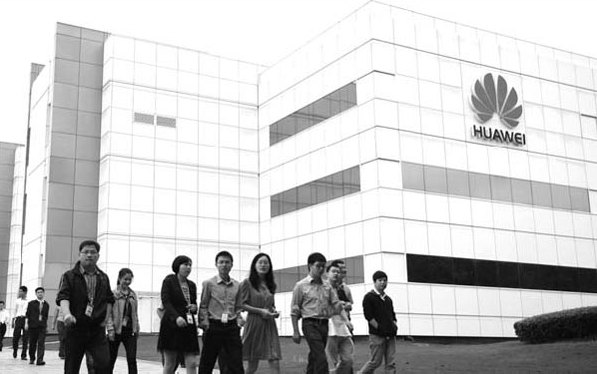Huawei, London college to explore big data future
Updated: 2013-07-04 07:51
By Wang Ying and He Wei in Shanghai (China Daily)
|
||||||||
|
A Huawei Technologies Co Ltd office in Shenzhen, Guangdong province. Huawei and the UK's Imperial College London will set up a research center tasked with exploring big data technology. Tyrone Siu / Reuters |
Chinese networking equipment maker Huawei Technologies Co Ltd has joined hands with the Imperial College London to develop big data technology, a move that will enable the world's second-largest telecom equipment supplier to further its expansion in the British market.
A memorandum of understanding was signed between Huawei and the college on Tuesday. Now the two sides will establish a research and innovation center tasked with exploring big data technology.
The center will enable academic researchers and business experts to collectively develop innovations and applications in research areas including digital, energy, healthcare, future cities and life sciences.
According to the plan, Imperial and Huawei will work to harness the latest scientific and technological breakthroughs around big data, a technology that allows people to collect and analyze huge amounts of information and also all dimensions of the human experience and translate them into real world applications.
"Big data serves as a tool to enable carriers and device manufacturers to better understand their customers' requirements so they can roll out tailor-made products and boost sales," said Wang Jun, an analyst with Beijing research firm Analysys International.
Huawei may optimize their own products as well as help local companies to adapt to market needs after acting as both an application developer and a solution provider, he added.
UK Government Universities and Science Minister David Willetts said this initiative is good news for the UK's science base, universities and the economy.
"Huawei's decision to collaborate with Imperial College London will keep the UK as a global leader in big data," Willetts said.
For Huawei, building a research center in London will help it leverage local academic resources and work alongside the government, Wang said.
Although based in China, Huawei receives around 70 percent of its revenue from abroad, with a heavy reliance on western Europe such as the UK and Germany and emerging Asian economies.
But the company's efforts to enter the US market were blocked by a US congressional report in October 2012, alleging the telecom equipment maker has a military background.
After Huawei overcame UK parliamentary committee concerns about its close integration into the UK's telecommunications infrastructure, the partnership progressed further, the Financial Times reported.
As one of the great technologies of the future, big data will allow scientists to research and analyze large amounts of information to support new innovations across industries such as space exploration, bioscience and healthcare," said Willetts.
Zhang Jin, principal analyst at IT consultancy Gartner Inc, said he believes Huawei's partnership with the college was expected.
"Developed countries have many more opportunities in the big data area. Huawei has a history of working with major European telecom carriers and it makes a lot of sense if they collaborate on this front," he said.
Compared with the US market, Zhang said Huawei's entry into Europe consisted of much fewer hurdles, with every operator showing an interest in working with the company.
"Only the US, Australia and India have expressed hesitations in getting Chinese companies involved in the Internet businesses. However, Huawei is still keen to penetrate the North American market if future opportunities come up."
Jiang Yinan in Shanghai contributed to this story.
Contact the writers at wang_ying@chinadaily.com.cn and hewei@chinadaily.com.cn
(China Daily USA 07/04/2013 page3)

 Ecuador finds spy mic for Assange meeting
Ecuador finds spy mic for Assange meeting
 US martial artists arrive at Shaolin Temple
US martial artists arrive at Shaolin Temple
 July 4 in Prescott: Balance of grief, patriotism
July 4 in Prescott: Balance of grief, patriotism
 Jubilant crowds celebrate after Mursi overthrown
Jubilant crowds celebrate after Mursi overthrown
 Growth slowing for services
Growth slowing for services
 Venezuela eyed as Snowden seeks asylum
Venezuela eyed as Snowden seeks asylum
 Anti-terror drill staged in Xinjiang
Anti-terror drill staged in Xinjiang
 Memorial service held for 19 Arizona firefighters
Memorial service held for 19 Arizona firefighters
Most Viewed
Editor's Picks

|

|

|

|

|

|
Today's Top News
US welcomes China's engagement in Africa
Data show shifts in US, China economies
Obama, Merkel agree talks on surveillance program
Filipino executed for drug trafficking
Obama orders US to review aid to Egypt
Snowden still in Moscow
China urges more efficient uses of fiscal funds
Egypt army topples president Morsi
US Weekly

|

|







